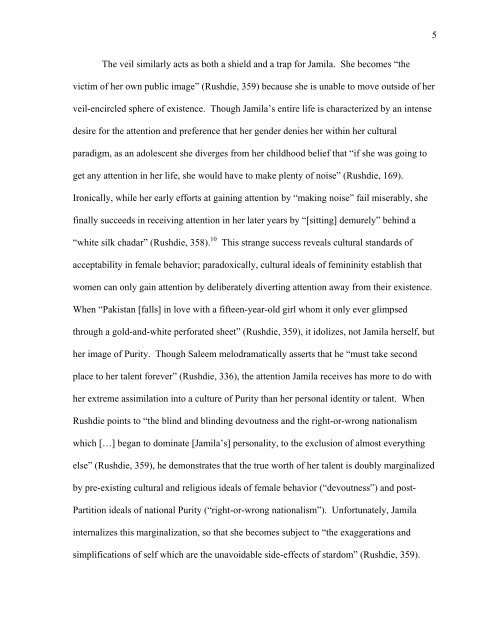The Secret Society: Descendants of Crypto-Jews in the San Antonio ...
The Secret Society: Descendants of Crypto-Jews in the San Antonio ...
The Secret Society: Descendants of Crypto-Jews in the San Antonio ...
Create successful ePaper yourself
Turn your PDF publications into a flip-book with our unique Google optimized e-Paper software.
5<br />
<strong>The</strong> veil similarly acts as both a shield and a trap for Jamila. She becomes “<strong>the</strong><br />
victim <strong>of</strong> her own public image” (Rushdie, 359) because she is unable to move outside <strong>of</strong> her<br />
veil-encircled sphere <strong>of</strong> existence. Though Jamila’s entire life is characterized by an <strong>in</strong>tense<br />
desire for <strong>the</strong> attention and preference that her gender denies her with<strong>in</strong> her cultural<br />
paradigm, as an adolescent she diverges from her childhood belief that “if she was go<strong>in</strong>g to<br />
get any attention <strong>in</strong> her life, she would have to make plenty <strong>of</strong> noise” (Rushdie, 169).<br />
Ironically, while her early efforts at ga<strong>in</strong><strong>in</strong>g attention by “mak<strong>in</strong>g noise” fail miserably, she<br />
f<strong>in</strong>ally succeeds <strong>in</strong> receiv<strong>in</strong>g attention <strong>in</strong> her later years by “[sitt<strong>in</strong>g] demurely” beh<strong>in</strong>d a<br />
“white silk chadar” (Rushdie, 358). 10<br />
This strange success reveals cultural standards <strong>of</strong><br />
acceptability <strong>in</strong> female behavior; paradoxically, cultural ideals <strong>of</strong> fem<strong>in</strong><strong>in</strong>ity establish that<br />
women can only ga<strong>in</strong> attention by deliberately divert<strong>in</strong>g attention away from <strong>the</strong>ir existence.<br />
When “Pakistan [falls] <strong>in</strong> love with a fifteen-year-old girl whom it only ever glimpsed<br />
through a gold-and-white perforated sheet” (Rushdie, 359), it idolizes, not Jamila herself, but<br />
her image <strong>of</strong> Purity. Though Saleem melodramatically asserts that he “must take second<br />
place to her talent forever” (Rushdie, 336), <strong>the</strong> attention Jamila receives has more to do with<br />
her extreme assimilation <strong>in</strong>to a culture <strong>of</strong> Purity than her personal identity or talent. When<br />
Rushdie po<strong>in</strong>ts to “<strong>the</strong> bl<strong>in</strong>d and bl<strong>in</strong>d<strong>in</strong>g devoutness and <strong>the</strong> right-or-wrong nationalism<br />
which […] began to dom<strong>in</strong>ate [Jamila’s] personality, to <strong>the</strong> exclusion <strong>of</strong> almost everyth<strong>in</strong>g<br />
else” (Rushdie, 359), he demonstrates that <strong>the</strong> true worth <strong>of</strong> her talent is doubly marg<strong>in</strong>alized<br />
by pre-exist<strong>in</strong>g cultural and religious ideals <strong>of</strong> female behavior (“devoutness”) and post-<br />
Partition ideals <strong>of</strong> national Purity (“right-or-wrong nationalism”). Unfortunately, Jamila<br />
<strong>in</strong>ternalizes this marg<strong>in</strong>alization, so that she becomes subject to “<strong>the</strong> exaggerations and<br />
simplifications <strong>of</strong> self which are <strong>the</strong> unavoidable side-effects <strong>of</strong> stardom” (Rushdie, 359).
















